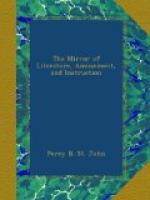NOVEMBER.
November is associated with gloom, inasmuch as its days and nights are, for the most part, sullen and sad. But the transition to this gloom is slow, gradual, and almost imperceptible. The mornings of the month are generally foggy, and are thus described by a modern poet:—
“Not pleasureless the morn, when dismal
fog
Rolls o’er the dewy plain, or thin
mist drives;
When the lone timber’s saturated
branch
Drips freely.”
In the progress of day,
“Shorn of his glory through the dim profound,
With melancholy aspect looks the orb
Of stifled day, and while he strives to
pierce
And dissipate the slow reluctant gloom,
Seems but a rayless globe, an autumn moon,
That gilds opaque the purple zone of eve,
And yet distributes of her thrifty beam.
Lo! now he conquers; now, subdued awhile,
Awhile subduing, the departed mist
Yields in a brighter beam, or darker clouds
His crimson disk obscure.”
The country has now exchanged its refreshing varieties of greens for the hues of saffron, russet, and dark brown. “The trees,” says an amusing observer of nature, “generally lose their leaves in the following succession:—walnut, mulberry, horse-chestnut, sycamore, lime, ash, then, after an interval, elm:
“——’To him who walks Now in the sheltered mead, loud roars above, Among the naked branches of the elm, Still freshening as the hurried cloud departs, The strong Atlantic gale.’
“Then beech and oak, then apple and peach trees, sometimes not till the end of November; and lastly, pollard-oaks and young beeches, which retain their withered leaves till pushed off by the new ones in spring.”
The rural economy of the month is thus described by the same writer:—“The farmer endeavours to finish his ploughing this month, and then lays up his instruments for the spring. Cattle are kept in the yard or stable, sheep turned into the turnip-field, or in bad weather fed with hay, bees moved under shelter, and pigeons fed in the dove-house.”
The gardens, for the most part, begin to show the wear of desolation, and but little of their floral pride remains without doors. Meanwhile, a mimic garden is displayed within, and the hyacinth, narcissus, &c. are assembled there to gladden us with anticipations of the coming spring.
Though sombre and drear, a November day is a carnival for the reflective observer; the very falling of the leaves, intercepted in their descent by a little whirl or hurricane, is to him a feast of meditation, and “the soul, dissolving, as it were, into a spirit of melancholy enthusiasm, acknowledges that silent pathos, which governs without subduing the heart.”—“This season, so sacred to the enthusiast, has been, in all ages, selected by the poet and the moralist, as a theme for poetic description and moral reflection;” and we may add that amidst such scenes, Newton drew the most glorious problem of his philosophy, and Bishop Horne his simple but pathetic lines on the “Fall of the Leaf,”—lessons of nature which will still find their way to the hearts of mankind, when the more subtle workings of speculative philosophy shall be forgotten with their promoters.




